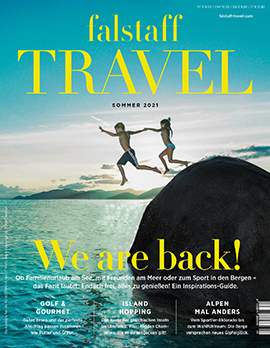
Mallorca - A Sea of Flavors
A new cuisine is emerging on the favorite island of European sun-seekers. Here, you'll find a combination of Balearic lifestyle, innovative ideas and the best of local produce. What's the best time to try it? Now!
August 19, 2024
Belmond La Residencia hotel was created from two historic buildings in the village of Deià. It has been a first-class address for 40 years. © provided
Paella, sangria and ham - this is how many travelers would have summed up the culinary highlights of Mallorca just a few years ago. If you ask Andreu Genestra, currently one of the most innovative local chefs, the answer is different: Rice, pork and tap de cortí, a sweet paprika powder. The local ingredients represent a transformation that the Grand Dame of the Balearic Islands has undergone. It's a development away from mass tourism, which has left its mark in many places, and towards a luxurious simplicity that focuses on the original advantages of the island. And there are a lot of different ones.
White sand and steep cliffs frame the Cala Llombards bay in the southeast of Mallorca. © Alamy Stock Photo
There's the azure-colored water of Cala Formentor high in the north, whose glittering waves can put you in a trance. Or the karstic beauty of the Tramuntana mountains in the northwest, part of the UNESCO World Heritage Site. Then, there's the charm of the brick houses surrounded by olive trees in the hinterland - and of course the capital Palma, where history and hipsterism meet in the streets of the old town. Throughout history, Mallorca has been besieged and conquered again and again because of its advantages: by Carthaginians, Romans, Vandals and Moors - and in more recent times by countless tourists. Those who could, stayed and Mallorca became a sunny enclave for northern Europeans.
The new generation
Neni restaurant on the roof of Bikini Island & Mountain Hotel overlooks Port Sóller. Steve Herud, Berlin for DREIMETA (interior design)
For a long time, upscale gastronomy on the island therefore meant chefs from abroad. For example, the Brit Marc Fosh or Germans such as Gerhard Schwaiger and the recently retired Josef Sauerschell. In recent years, however, new names have been added: Fernando P. Arellano, Santi Taura, Maca de Castro, Marga Coll, Andreu Genestra. And not forgetting the sisters María and Teresa Solivellas. In 2001, they took over the restaurant Ca Na Toneta from their mother Catalina. From then on, they served a multi-course menu consisting exclusively of products from the island. Their radically local cuisine turned the village restaurant into one of Mallorca's gastronomic hotspots. It also paved the way for the exciting culinary scene that can be found on the island today.


Restaurants, bars and producers explore what the traditional cuisine of the Balearic Islands has to offer; its origins in rural culture, its location between the Mediterranean and the mountains and the diversity of its agricultural produce. The result is a rich recipe book - but there's also a lot of work that goes into this Mallorcan cuisine that you don't see. This ranges from the zero-kilometer philosophy to their own beehives and circular economy to renewable energies as well as the many patient conversations it takes to implement an innovative idea. With its ramallet tomatoes, black pork and fish that was previously labeled as bycatch, this new Mediterranean cuisine may seem simple. But tasting it feels like breathing a sigh of relief, like arriving.
Palm trees at Belmond La Residencia. ©www.aquilamattia.it
It has taken hotels a while to open up to this development and its representatives. Why serve fish in escabeche, a sour marinade made from local vegetables, when guests love ceviche? But in upscale tourism, destinations that are also interesting from a culinary point of view win out. That's why Santi Taura, who was born on Mallorca, now serves dishes that are somewhere between nostalgia and deconstruction at DINS, the gourmet restaurant at El Llorenç hotel in Palma.
The olives served by celebrity chef Ramón Freixa at The Lodge come from the hotel garden. © provided
Jordi Cantó runs the renowned restaurant Sa Clastra at the luxury hotel Castell Son Claret, and Andreu Genestra opened his new restaurant at Hotel Zoëtry in Llucmajor. The bar scene shows just how far the trend extends: Matías Iriarte's Chapeau 1987 only serves drinks that represent one aspect of the island, the mountains, the forest or the sea. And thanks to the bar La Sang in the old town of Palma, there has also been a place to taste unfiltered and organically grown Mallorcan wines since 2019. It's considered one of the top ten natural wine bars in Spain.


Once again, Mallorca is undergoing change: New laws are intended to steer tourism in a more sustainable direction. However, the newly opened hotels will probably have more influence on who comes to Mallorca in the future. Hotels such as Son Bunyola by Virgin boss Richard Branson, Son Net in a 17th century estate or Hotel Corazón, a finca without a television, run by two artists. Its understated and sustainable luxury fits in well with the authenticity that can still be found on the island - and it attracts all those who are ready to fully immerse themselves in Mallorca.
Read more: Worth a visit: 5 boutique hotels on Mallorca

This article appeared in the Falstaff TRAVEL issue Summer 2024.






